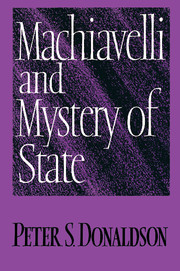Book contents
- Frontmatter
- Contents
- Preface
- 1 Machiavelli and Antichrist: prophetic typology in Reginald Pole's De Unitate and Apologia ad Carolum Quintum
- 2 Bishop Gardiner, Machiavellian
- 3 John Wolfe, Machiavelli, and the republican arcana in sixteenth-century England
- 4 Machiavelli and the arcana imperii
- 5 Gabriel Naudé: magic and Machiavelli
- 6 Biblical Machiavellism: Louis Machon's Apologie pour Machiavel
- Index
6 - Biblical Machiavellism: Louis Machon's Apologie pour Machiavel
Published online by Cambridge University Press: 06 July 2010
- Frontmatter
- Contents
- Preface
- 1 Machiavelli and Antichrist: prophetic typology in Reginald Pole's De Unitate and Apologia ad Carolum Quintum
- 2 Bishop Gardiner, Machiavellian
- 3 John Wolfe, Machiavelli, and the republican arcana in sixteenth-century England
- 4 Machiavelli and the arcana imperii
- 5 Gabriel Naudé: magic and Machiavelli
- 6 Biblical Machiavellism: Louis Machon's Apologie pour Machiavel
- Index
Summary
Louis Machon was born about 1600 in the Lorraine, where his father was councillor and secretary of the archdiocese of Toul. We know little of his early life and education. He spent the years, 1625–6 at the College de Boncourt in Paris, and by the early 1630s was himself episcopal cannon and chaplain of Toul. In 1633 the bishop of Toul resigned, and a complex and lengthy controversy arose involving the episcopal cannons, the pope, and the government of Cardinal Richelieu concerning the proper way to replace him. The details need not concern us here, except insofar as negotiations between the archdiocese and Paris brought Machon into contact with Richelieu and propelled him into the midst of the complexities surrounding the question of the union of France with the Lorraine that were to occupy him for more than a decade. At first, Machon had taken the view that the king ought to recognize that the archdiocese was “entirely at the disposition of the Holy See” and had composed a “remonstrance” to the king on the question in 1633. But shortly afterward, we find him taking the opposite view and preparing memoranda for Richelieu supporting the government's position. Richelieu asked Machon to prepare a complete study of the question of the relation between papal and royal power in France; the massive work was completed only after Richelieu's death in 1642.
- Type
- Chapter
- Information
- Machiavelli and Mystery of State , pp. 186 - 222Publisher: Cambridge University PressPrint publication year: 1989



